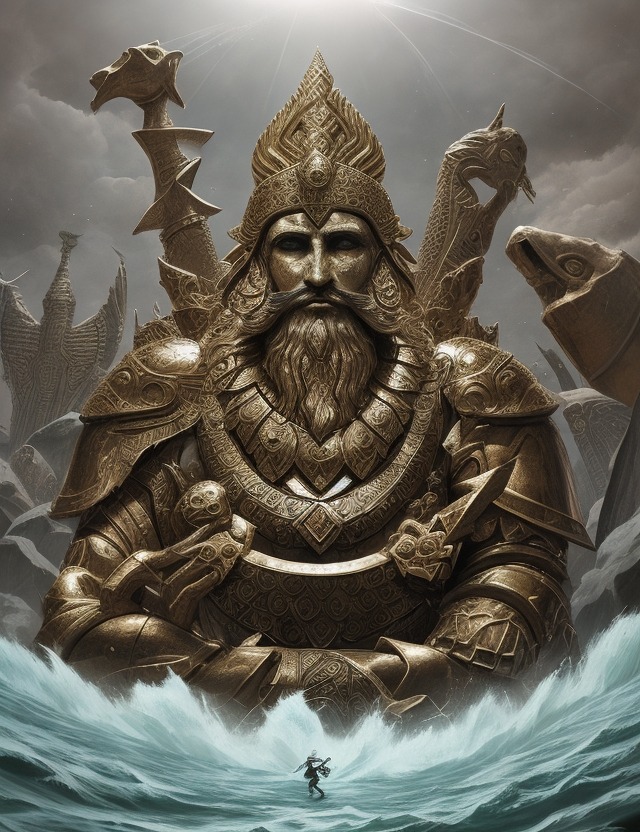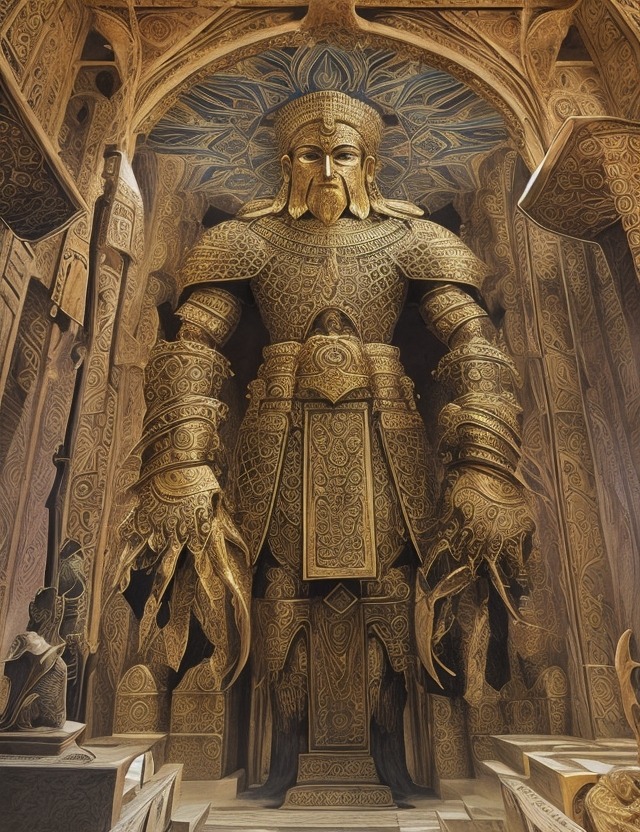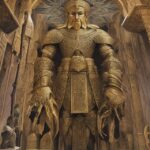Have you ever wondered what lies beneath the layers of ancient history, captivating the minds of countless scholars and explorers throughout the ages? Delve into the mystical classic realm of Mesopotamia with “The Epic of Gilgamesh,” one of the earliest surviving works of literature known to mankind. This captivating masterpiece, written by an anonymous author thousands of years ago, offers a mesmerizing glimpse into the epic adventure of Gilgamesh, the legendary king of Uruk. Unlocking the secrets of ancient civilizations and their fascinating myths, this profound narrative unravels the journey of a heroic protagonist who grapples with the complexities of mortality, the pursuit of immortality, and the profound power of friendship.
Join us on an extraordinary quest that intertwines history, mythology, and existential ponderings, as we explore the exhilarating pages of “The Epic of Gilgamesh” and unravel the timeless wisdom contained within. Get ready to embark on an adventure that will leave you in awe, as you uncover the ancient echoes resonating throughout this remarkable tale.
The Epic of Gilgamesh Plot Summary
Once upon a time, in the ancient land of Mesopotamia, there was a mighty king named Gilgamesh. He was not just an ordinary king, but a half-god, with incredible strength and wisdom. He ruled the city of Uruk with power and splendor, but the people of Uruk also feared him, for he was harsh and cruel.
One day, a brave and fearless man named Enkidu came to Uruk. Enkidu had been raised by animals in the wilderness, and he possessed remarkable strength and agility. When he heard of Gilgamesh’s tyranny, he decided to confront him. And so, Enkidu challenged Gilgamesh to a great wrestling match.
The match was fierce and intense, but in the end, neither Gilgamesh nor Enkidu emerged as the clear winner. They fought with equal strength and skill. However, instead of being enemies, they found a deep connection and formed a strong friendship. They realized that they complemented each other – Gilgamesh with his wisdom and Enkidu with his wild nature.
United, Gilgamesh and Enkidu set out on great adventures together. Their first quest was to defeat a fearsome giant named Humbaba, who guarded the Cedar Forest. To reach the forest, they had to cross the land of the gods, confronting various challenges and tests along the way. With their combined strength and determination, they were able to overcome all obstacles.
When they finally reached the Cedar Forest, Humbaba launched a ferocious attack. But Gilgamesh and Enkidu fought bravely and managed to defeat the giant, slicing off his head. They celebrated their victory but soon faced repercussions for their actions.
The gods, angered by the death of Humbaba, decided to punish the friends. As a consequence, Enkidu fell gravely ill and suffered greatly. Gilgamesh was heartbroken, watching his dearest friend in pain. In his despair, Gilgamesh sought a way to undo the damage and save Enkidu.
Determined to find the secret to immortality, Gilgamesh embarked on a new journey. He traveled to the edge of the world, where he met Utnapishtim, the one man who had been granted eternal life. Utnapishtim told Gilgamesh the story of the Great Flood, when the gods decided to destroy humanity. He explained that he had been warned by Ea, the god of wisdom, and built a great boat to survive.
Utnapishtim revealed that the gods had granted him immortality as a reward for his survival. Seeing Gilgamesh’s determination, he offered him a challenge – to stay awake for seven days and seven nights. If Gilgamesh succeeded, he would obtain eternal life. But no matter how hard Gilgamesh tried, he couldn’t resist the call of sleep.
Disappointed, Utnapishtim revealed a secret plant that could restore youth. He explained that it grew at the bottom of the great ocean. Determined to save his friend, Gilgamesh dove into the depths of the sea and retrieved the miraculous plant.
Filled with hope, Gilgamesh began his journey back to Uruk. On the way, he decided to take a rest by a refreshing pool. Unfortunately, while he was bathing, a serpent slithered out and snatched away the plant of rejuvenation. Devastated, Gilgamesh knew that his quest for immortality had failed.
Returning to Uruk, Gilgamesh realized the true meaning of his adventures. He understood that immortality was not his destiny but rather making a lasting impact through his deeds. He ruled Uruk with kindness and fairness, transforming it into a prosperous and admired city.
The Epic of Gilgamesh teaches us important lessons about friendship, the value of life, and the acceptance of our own mortality. Gilgamesh’s journey shows the importance of compassion and understanding. Through his friendship with Enkidu, he learns to value the lives of his subjects and the world around him.
So children, remember the story of Gilgamesh, a mighty king who discovered that true strength lies in the quality of our deeds and the connections we forge. May you always cherish your friendships and strive to make a positive difference in the world, just as Gilgamesh did.
The Epic of Gilgamesh Flood Story

The epic of Gilgamesh is an ancient Mesopotamian poem that tells the story of Gilgamesh, a legendary king of Uruk, and his quest for immortality. One of the episodes in the poem is the flood story, which is similar to the biblical story of Noah and the ark. The flood story is told by Utnapishtim, a survivor of the great deluge that wiped out all life on earth, except for him and his family. Utnapishtim reveals to Gilgamesh how he was warned by the god Ea to build a boat and save himself, his relatives, his animals, and his craftsmen from the wrath of the god Enlil, who wanted to destroy mankind for their noise and wickedness.
Utnapishtim also tells how he endured the storm for seven days and nights, how he released birds to find land, and how he offered sacrifices to the gods after landing on Mount Nimush. He also tells how he was granted eternal life by the gods as a reward for his obedience and preservation of life. The flood story is one of the oldest and most influential myths in world literature, and it reflects the ancient Mesopotamian worldview and values, such as the role of the gods, the fate of mankind, and the importance of loyalty and wisdom.
The Epic of Gilgamesh: Key Themes
The Epic of Gilgamesh is an ancient Mesopotamian literary work that dates back to the 2nd millennium BCE. It is considered one of the earliest surviving pieces of literature and provides valuable insights into the culture and beliefs of the ancient Sumerians. The epic follows the adventures of its protagonist, Gilgamesh, the king of Uruk. Here are three key themes of The Epic of Gilgamesh:
1. Friendship and companionship: Throughout the epic, the theme of friendship is central to the narrative. Gilgamesh forms a deep bond with Enkidu, a wild man created by the gods to challenge Gilgamesh’s power. Enkidu becomes Gilgamesh’s loyal companion and they embark on various quests together. This theme explores the significance of human connection and the transformative power of friendship in shaping one’s character.
2. Mortality and the search for immortality: Another crucial theme in the epic is the exploration of mortality and the desire for immortality. After Enkidu’s untimely death, Gilgamesh becomes obsessed with the fear of his own mortality. He embarks on a quest to find eternal life, seeking the counsel of Utnapishtim, the only survivor of the great flood who was granted immortality by the gods. Through this theme, the epic addresses the universal human fear of death and the longing for eternal life.
3. The nature of humanity and the hero’s journey: The Epic of Gilgamesh also delves into the nature of humanity and the hero’s journey. Gilgamesh, in his search for meaning and purpose, undergoes a personal transformation throughout the narrative. From an arrogant and tyrannical king, he learns humility, empathy, and the acceptance of his own limitations. This theme examines the human condition, the individual’s quest for self-discovery, and the development of wisdom and compassion.
Overall, The Epic of Gilgamesh explores these key themes of friendship, mortality, and the hero’s journey to convey timeless messages about the nature of humanity and the pursuit of immortality.
The Epic of Gilgamesh: Characters
- Gilgamesh: The protagonist of the story, Gilgamesh is the powerful and arrogant king of Uruk. He is described as being two-thirds god and one-third human, possessing immense strength and beauty. Known for his extravagant lifestyle, he frequently abuses his power and mistreats his people. Throughout the epic, Gilgamesh undergoes a transformative journey to find immortality and learns valuable lessons about friendship and mortality.
- Enkidu: Enkidu is a wild man created by the gods to stop Gilgamesh’s oppression of his people. Physically, he is covered in hair and possesses incredible strength. Enkidu initially challenges Gilgamesh to a wrestling match but eventually becomes his loyal companion. Together, they embark on various adventures and battles. Enkidu’s character serves to contrast Gilgamesh’s arrogance and helps him discover his own vulnerabilities and empathy.
- Shamhat: Shamhat is a temple prostitute who civilizes Enkidu by seducing him. She is described as a beautiful woman who possesses great charm and allure. Shamhat plays a pivotal role in the story by introducing Enkidu to civilization and paving the way for his friendship with Gilgamesh.
- Ishtar: Ishtar, the goddess of love and war, plays a significant role in the story, as she becomes infatuated with Gilgamesh. Described as stunningly beautiful, Ishtar is also known for her impulsive and unpredictable temperament. She proposes marriage to Gilgamesh and offers him immense wealth and power, but Gilgamesh rejects her advances, leading to her wrath and his subsequent challenges.
- Utnapishtim: Utnapishtim is a wise and god-like figure who possesses eternal life. Described as an elderly man with a long white beard, he is the only survivor of the great flood sent by the gods. Utnapishtim offers Gilgamesh the opportunity to gain immortality if he can pass a series of trials. Throughout the story, Utnapishtim imparts wisdom and lessons on the nature of life, death, and the importance of acceptance.
- Ea: Ea is the god of wisdom and water, who acts as a mentor to Utnapishtim. Described as a deity with flowing, blue hair and a long beard, Ea provides guidance to his chosen mortal and advises him on how to navigate and survive the gods’ wrath. He serves as the wise and compassionate voice that guides Utnapishtim and encourages him to share his secrets with Gilgamesh.
- Humbaba: Humbaba is the guardian of the Cedar Forest, and Gilgamesh seeks to kill him to prove his bravery. Described as a fearsome, monstrous creature with a lion’s head and a massive body covered in protective armor, Humbaba is a formidable opponent. However, he is eventually defeated by Gilgamesh and Enkidu. Despite his terrifying appearance, Humbaba’s defeat raises questions about the ethics of exploiting nature and the consequences of unchecked ambition.
- Siduri: Siduri is the tavern keeper of the gods, residing at the edge of the world. Described as a wise and beautiful woman, she advises Gilgamesh during his journey after Enkidu’s death. Known for her hospitality, Siduri offers Gilgamesh guidance and encourages him to appreciate the small joys in life rather than constantly pursuing immortality.
- Urshanabi: Urshanabi is the ferryman who helps Gilgamesh cross the Waters of Death to reach Utnapishtim. Described as an old man with a boat that can navigate the treacherous waters, Urshanabi aids Gilgamesh after he proves himself worthy. He symbolizes the intermediary between the mortal and divine realms and provides Gilgamesh with a means to reach Utnapishtim and attain wisdom.
- The Bull of Heaven: The Bull of Heaven is sent by Ishtar as a punishment for Gilgamesh’s rejection of her advances. Described as a massive, supernatural creature with fiery breath, the Bull of Heaven causes chaos and destruction wherever it goes. Gilgamesh and Enkidu team up to defeat the bull, showcasing their strength and bravery.
- The Scorpion-Men: The Scorpion-Men are mythical creatures that guard the path to the Cedar Forest. Described as half-human and half-scorpion, they present a formidable obstacle for Gilgamesh and Enkidu. These creatures add a fantastical element to the story and test the heroes’ resolve on their journey.
- The Snake: The Snake plays a pivotal role in the story when it steals the magical plant of immortality from Gilgamesh. Described as a cunning creature, the snake interrupts Gilgamesh’s quest just as he obtains the plant that promised eternal life. This event serves as a reminder of the transient nature of existence and the inevitability of death.
The Epic of Gilgamesh: Symbols
1. The Cedar Forest: The Cedar Forest is a prominent symbol in The Epic of Gilgamesh. It represents the untamed and dangerous aspects of the natural world. The forest is described as divine and sacred, filled with valuable trees that are protected by the gods. This symbolizes the challenge and risk that Gilgamesh must face in his quest for immortality. The forest also represents the unknown and the fear of what lies beyond, as Gilgamesh and Enkidu venture into the forest to confront Humbaba. Thus, the Cedar Forest symbolizes the need for humans to confront their fears and overcome challenges to attain personal growth and self-discovery.
2. The Bull of Heaven: The Bull of Heaven is a powerful symbol in the epic. It represents both nature’s wrath and divine justice. The goddess Ishtar sends the Bull of Heaven to punish Gilgamesh for rejecting her advances. The bull represents the uncontrollable and destructive forces of nature, unleashed as a consequence of human actions. Its appearance signifies the imbalance caused by human arrogance and reminds Gilgamesh of the need for humility before the divine. The bull’s defeat ultimately teaches Gilgamesh a lesson about the limits of human power and the importance of respecting the gods and the natural order.
3. The Plant of Immortality: The Plant of Immortality is a significant symbol in the epic, representing the human desire for eternal life. Gilgamesh seeks the plant after witnessing the death of his close friend, Enkidu. The plant symbolizes the quest for immortality and the fear of death that drives it. However, the plant is eventually stolen by a serpent, denying Gilgamesh the possibility of eternal life. This symbolizes the inevitability and finality of death. Through this loss, Gilgamesh learns to accept his mortality, realizing that the true legacy lies in the impact one has on others and the world during one’s lifetime. The Plant of Immortality thus serves as a reminder that the pursuit of everlasting life may come at the expense of appreciating and valuing the finite nature of human existence.
Moral of The Epic of Gilgamesh
The poem has several moral themes, but one of the main ones is that love is a motivating force. Love can inspire people to be better, to overcome their flaws, and to cherish life. Some of the ways that love is shown in the poem are:
- The friendship between Gilgamesh and Enkidu. They start as rivals, but soon become inseparable companions. They help each other grow and learn, and they face many dangers and adventures together. When Enkidu dies, Gilgamesh is devastated and realizes how much he valued his friend.
- The loyalty of Utnapishtim and his wife. They are the only survivors of the great flood that wiped out all life on earth, except for them and their animals. They obeyed the god Ea, who warned them to build a boat and save themselves from the wrath of the god Enlil. They also shared the secret of eternal life with Gilgamesh, who was their guest.
- The compassion of Siduri and Urshanabi. They are the tavern-keeper and the ferryman who live near the edge of the world. They show kindness and sympathy to Gilgamesh, who is weary and sorrowful after his long journey. They offer him food, drink, and advice, and they help him cross the waters of death to reach Utnapishtim.
Another moral theme in the poem is the inevitability of death and the importance of accepting one’s mortality. Gilgamesh learns that death is an inescapable fact of human life, and that even the gods cannot change it. He also learns that immortality is not a desirable state, as it comes with isolation and boredom. He realizes that the best way to live is to enjoy the present, to honor the memory of the dead, and to leave a lasting legacy for the future.
The Epic of Gilgamesh: Culture Impact
The Epic of Gilgamesh, often regarded as the oldest surviving work of literature, bears an immense cultural impact that resonates through time. Dating back to ancient Mesopotamia, the book’s historical significance is unparalleled, as it offers a fascinating glimpse into the beliefs, values, and customs of this ancient civilization.
Considering the historic data surrounding the book, The Epic of Gilgamesh provides a window into the rich tapestry of Mesopotamian society, unraveling aspects of their religion, politics, and daily life. This epic tale follows the adventures of Gilgamesh, a legendary king, and his loyal companion Enkidu, as they embark on a quest for immortality. Through their journeys, readers gain insights into the societal structure, religious rituals, and moral codes of ancient Mesopotamia.
One of the remarkable achievements of The Epic of Gilgamesh is its portrayal of human emotions and questioning of mortality. It explores universal themes like friendship, love, grief, and the search for meaning, transcending the boundaries of time and culture. This ancient text delves deeply into the human condition, offering readers of any era a poignant reflection on their own existence.
Despite being an ancient work, The Epic of Gilgamesh has a myriad of funny anecdotes and humorous moments. An example being Gilgamesh’s initial arrogance and his eventual realization that true power lies not in physical strength, but in compassion and humility. The epic’s blend of serious themes with light-hearted moments provides a balance that keeps readers engaged and entertained.
From a cultural standpoint, this book has left an indelible mark on subsequent literary traditions and influences. Elements of The Epic of Gilgamesh can be found in many subsequent epics and religious texts, including the Bible’s recounting of the flood story in the Book of Genesis. It has served as a source of inspiration for numerous authors, poets, and scholars over centuries, influencing their works in various ways.
Furthermore, The Epic of Gilgamesh not only highlights the cultural achievements of ancient Mesopotamia but also showcases the advancements in literature and writing during that time period. The use of cuneiform script to record this epic demonstrates the sophistication and development of written language in ancient societies, solidifying its status as a landmark in the history of human communication.
In summary, The Epic of Gilgamesh stands as a cultural treasure that offers much more than just a captivating story. Its historic significance, humorous moments, and achievements in literature and writing make it a book that has withstood the test of time. This ancient masterpiece continues to impact and inspire readers, allowing us to connect with the distant echoes of a civilization that thrived thousands of years ago.
FAQs
1. What is “The Epic of Gilgamesh” about?
“The Epic of Gilgamesh” is an ancient Mesopotamian poem that tells the story of Gilgamesh, a demigod king who embarks on a quest for immortality. The epic explores themes of friendship, grief, and the consequences of arrogance.
2. Who wrote “The Epic of Gilgamesh”?
“The Epic of Gilgamesh” is believed to have been written by several Babylonian authors around 2100 BCE. It was written on clay tablets in cuneiform script, one of the earliest known forms of writing.
3. Is “The Epic of Gilgamesh” based on a true story?
While “The Epic of Gilgamesh” contains elements of historical events and figures, it is considered a work of mythology rather than a strictly historical account. The exploits of Gilgamesh and his companions are believed to be mythical tales passed down through generations.
4. What is the significance of “The Epic of Gilgamesh”?
“The Epic of Gilgamesh” is not only one of the oldest surviving works of literature but also offers valuable insights into ancient Mesopotamian culture and beliefs. It explores timeless themes and serves as a window into the human condition.
5. Is there a moral or lesson to be learned from “The Epic of Gilgamesh”?
Yes, “The Epic of Gilgamesh” contains several moral lessons. It highlights the importance of friendship, the value of living a meaningful life, and the acceptance of mortality. Additionally, it serves as a cautionary tale about the dangers of unchecked power and arrogance.










